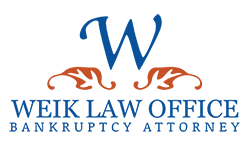GET HELP TODAY
If you’re deep in tax debt and planning to file Chapter 7 or Chapter 13 bankruptcy in Raleigh to wipe it out, we’re here to warn you: bankruptcy will not discharge all tax debt.
In fact, be careful about any bankruptcy attorney that promises you it can be done. For instance, Attorney Weik has won tens of thousands of bankruptcy petitions for North Carolina residents. This includes helping them pause evictions, stop wage garnishment, and keep their vehicles while they recover from overwhelming debt.
However, the relationship between tax debts and bankruptcy is complicated, and at the Weik Law Office, we’re transparent about what bankruptcy can and cannot do.
Getting rid of tax debts falls under the latter, except in a few cases.
The IRS is a creditor just like any other.
A tax debt is any money you owe to the government, such as income taxes, business taxes, and excise taxes.
You can owe a tax debt for many reasons, such as filing incorrectly, not filing a return at all, or failing to make a payment that was due.
The IRS is a creditor like any other and has the right to collect on those taxes. They can take the following actions to collect that money:
- The IRS can file a lawsuit against you in tax court.
- The IRS can garnish your wages or bank account.
- The IRS can file a federal tax lien against your assets (property).
Compounding the problem is that the IRS and other taxing authorities have very powerful collections tools at their disposal– tools that aren’t available for regular creditors.
As an example, if you’re behind on credit card payments or loan payments, the creditor cannot just seize money from your bank account. They must sue you first and obtain a judgment allowing them to do so.
In contrast, taxing authorities can just seize your bank account without having to take any further steps.
That’s why we understand Just how overwhelming tax debts can be.
Fortunately, there are a few cases when an experienced bankruptcy lawyer in Raleigh, NC can help you discharge your taxes through bankruptcy.
Discharging Tax Debts Under Chapter 7 Bankruptcy
You may be able discharge your tax debts under Chapter 7 bankruptcy, but there are strict conditions. Some of the requirements you must meet are:
- The taxes must be income based, specifically, state income taxes.
- The return was due more than three years before you filed for bankruptcy.
- You have filed a tax return within two years before filing for bankruptcy.
- Your tax assessment occurred more than 240 days prior to filing for bankruptcy.
The exact regulations are complicated. During your consultation, Attorney Weik will carefully evaluate your case to see if you qualify for a tax debt discharge under Chapter 7.
Chapter 13 Offers Another Option
Unlike a Chapter 7 debt discharge, a Chapter 13 bankruptcy plan is designed to reorganize your debts.
That means that you’ll make monthly payments to the Chapter 13 trustee for three to five years, and at the end of your case, you’ll get a discharge (release) of some or all of your debts.
How does this help with tax debts? You can:
- Repay your tax debt in full or in part over time as part of your Chapter 13 plan
- Pay less than you owe by getting rid of other types of debts
- Get a discharge of other debts altogether after your Chapter 7 payment period, freeing up more resources you can use to repay your tax debts
Again, this depends on your particular case. As your bankruptcy attorney in Raleigh NC, Attorney Weik will walk you through both your Chapter 7 and Chapter 13 options to find the best possible solution to your debt problem.
Get Your Debts Under Control Today
While filing for bankruptcy in Raleigh, NC is not a cure-all, it does have a powerful impact in cases that do qualify for debt relief.
For example, it can help you eliminate many of life’s most crushing types of debt, such as medical debt and credit card debt. Trust Attorney Weik to advocate for you during every step of the journey.
Call Weik Law Office today at 919-845-7721 for a free consultation, and set up a time to speak with one of our friendly professionals.

